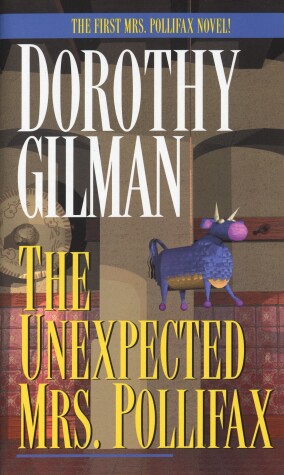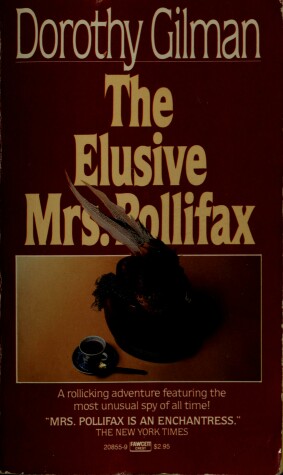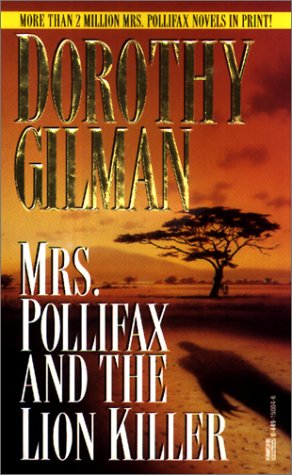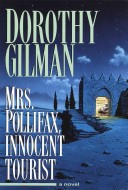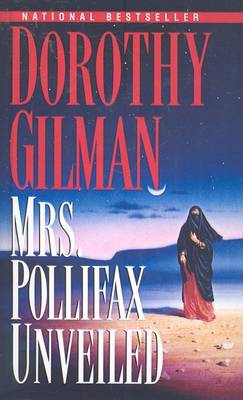Mrs. Pollifax
7 primary works • 8 total works
Book 1
Mrs. Virgil (Emily) Pollifax of New Brunswick, New Jersey, was a widow with grown, married children. She was tired of attending her Garden Club meetings. She wanted to do something good for her country. So, naturally, she became a CIA agent.
She takes on a “job” in Mexico City. The assignment doesn’t sound dangerous at first, but then, as often happens, something goes wrong. Now our dear Mrs. Pollifax finds herself embroiled in quite a hot Cold War—and her country’s enemies find themselves entangled with one unbelievably feisty lady.
“Mrs. Pollifax gives Agatha Christie’s Miss Marple a rival to reckon with.”—Toronto Star
Book 2
“You are in effect replacing a dead man, Mrs. Pollifax. . . .”
When Emily Pollifax answered the phone that Sunday morning she quickly forgot about her Garden Club tea in the afternoon. The last time she had heard the voice on the other end of the line it had sent of her off on a journey that plunged her into a wild tangle of secret agents and high adventure.
Now the man from the CIA was asking if she could leave immediately on a mission that would take her halfway across the world. What could Mrs. Pollifax say but yes?
Praise for The Amazing Mrs. Pollifax
“Mrs. Pollifax is an enchantress.”—The New York Times
“One of the most suspense-creating and unorthodox heroines of our time is Mrs. Pollifax . . . . A charmer!”—Shrevport Times
Book 3
If you make it across the border, get us help. Some of us care. Do you understand? Right now we desperately need passports and identity papers. The arrests grow insane.
At the very hour this message was en route to the CIA, Mrs. Pollifax was waiting for her night-blooming cereus to do its thing.
She hardly got to see it, however, because Mr. Carstairs was already on his way to recruit that gallant lady for another daring mission.
Soon the most unlikely of all international spies was sporting a beautiful new hat—perfect for hiding eight forged passports.
“Mrs. Pollifax is an enchantress.”—The New York Times
Book 10
But like all Mrs. P's assignments, so ostensibly suitable for the CIA's favorite garden club member, this one quickly turns lethal. Her welcoming committee in Palermo includes a most unlikely CIA agent and several unseen enemies. Unfriendly eyes also observe Mrs. P's rendezvous with Farrell in a secluded mountain village and weapons are soon displayed. With mysterious forces hot after them, she and Farrell scurry for safety to a fortified country villa, where the bizarre chatelaine, once a star on Madison Avenue, is almost as unnerving as the dangers she's protecting them from.
So, though the sun shines brightly, the food is delicious, and romance is in the air, Mrs. Pollifax is too busy handing out karate chops and playing catch-me-if-you-can with an assassin to enjoy the amenities . . . .
"Mrs. Pollifax gives Agatha Christie's Miss Marple a rival to reckon with." -- The Toronto Star
Book 12
Book 13
Hardly are the two airborne when the coils of Middle Eastern intrigue begin to unwind. Mrs. Pollifax's seatmate is not the affable Arab businessman he pretends to be. It is not imagination that persuades Mrs. P. that wherever they go, she and Farrell are followed. To elude their pursuers in such a politically volatile country isn't easy. In fact, it can be downright deadly. . . .
Book 14
After facing down hijackers on a flight to the Middle East and saving the lives of the passengers on board, a young American woman steps off the plane in Damascus in a blaze of celebrity and disappears. The CIA believes Amanda Pym was kidnapped, possibly murdered.
Masquerading as Amanda Pym’s worried aunt, Mrs. Pollifax begins her determined search, slipping through Damascus’s crooked streets and crowded souks . . . and trekking deep into the desert. Yet she is shadowed by deadly enemies, whose sinister agenda threatens not only Mrs. P. but the fragile stability of the entire Middle East. Only a miracle–or a brilliant counterplot—can forestall a disaster that will send shock waves around the world.
“Ms. Gilman has a nice, relaxed style and an easygoing way of telling a story.”—The New York Times Book Review
